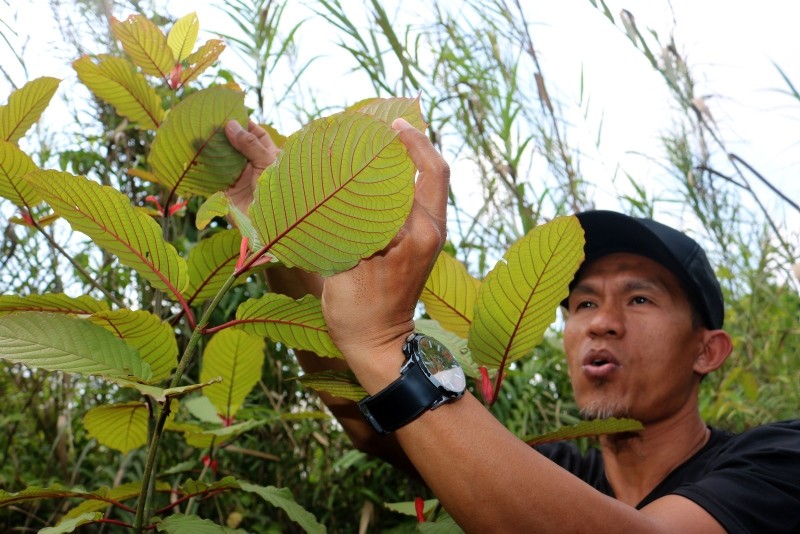Inside the wildly popular gas station drug RFK Jr. wants to ban to prevent the next opioid crisis
By Katelyn Caralle
Daily Mail
Jul 29, 2025

Some kratom plant products – like Feel Free botanical tonics – have recently gone viral with consumers claiming they quickly became addicted and dependent on the substance available at their local gas stations.
Robert F. Kennedy Jr. is cracking down on an opioid-like substance that has gone wildly viral for its addictive properties, misleading marketing and its wide availability.
The Department of Health and Human Services recommended on Tuesday that the Drug Enforcement Administration schedule 7-hydroxymitragynine (7-OH) - a compound that appears in kratom leafs - as a class one illicit substance.
Kennedy says the hope is that scheduling it as a controlled substance will help 'prevent the fourth wave of addiction' in the U.S. and Food and Drug Commissioner Marty Makary says it's 13 times more potent than morphine.
Currently, drinks, gummies and supplements with trace amounts of 7-OH from the kratom plant are widely available for purchase at smoke shops and convenience stores.
Some kratom plant products – like Feel Free botanical tonics – have recently gone viral with consumers claiming they quickly became addicted and dependent on the substance available at their local gas stations.
HHS recognizes the increase in reports of overdoses and emergency room visits linked to products containing 7-OH, many times from young people, veterans and people suffering from chronic pain.
Many who consume 7-OH claim they were not aware they were taking an addictive product. Others who bought it thought they were purchasing a product with the potency of an energy drink.
RFK Jr. and Makary warn that if 7-OH is allowed to remain on shelves, it will result in another opioid-crisis like in the 1990s and 2010s.

During a Tuesday press conference, the two officials announced they are initiating the process to have the DEA classify 7-OH as an illegal controlled substance. They cited its opioid-like effects on the brain as justification for the scheduling.
It can take months and even years for drugs to get official scheduling by the DEA, but leadership at HHS and FDA make clear that this is a priority and suggest the process will be expedited.
The DEA must review the recommendation, which can take between two and six months. Then the rule must be opened for a public comment period, which is between 30 and 60 days.
During this time, advocates for the use of kratom leaf are likely to come out in opposition of the drug classification.
There are many kratom leaf products, like teas and other drinks, that do not fall in the same category as products that have trace amounts of 7-OH.
Makary made very clear that the FDA was not focusing on kratom leaf and only the 7-OH compound.
Companies that use kratom leaf with trace amounts of 7-OH in their products claim they help with relaxation and pain, as well as assist with productivity and focus.
Makary said: '7-OH is not just like an opioid, it does not just have opioid binding properties. 7-OH binds to the mu receptor, which means, scientifically by definition, it is an opioid.'

'And yet it is sold in vape stores, in smoke shops and convenience stores and gas stations that are popping up all over the United States, and nobody knows what it is,' Markay lamented during a press conference at the HHS building on Tuesday.
'It is a synthetic concentrated by-product of kratom. Our focus is not on kratom. Our focus is on 7-OH,' he added.
Deputy HHS Secretary Jim O’Neill warned: '7-OH carries a high risk of addiction, on purpose. It is a powerful opioid agonist, many times more potent than morphine,' sold online and in stores with no quality or dosage constraints.
'Young people, veterans and people who suffer from chronic pain or addiction are being misled into thinking that these are safe alternatives. They are not,' he concluded.

RFK Jr. (center) and FDA Commissioner Marty Makary (left) say that 7-OH is more potent than morphine

Kratom leaf – and trace amounts of 7-OH – appear in many products available at gas stations and smoke shops, including in gummies, drinks and tablets. They are often sold as a 'dietary supplement'
RFK Jr. opened up about his years-long struggle with heroin addiction and said part of the HHS effort to schedule 7-OH is also to educate the American public about the threat it poses.
'When there is availability that can become a crisis,' Secretary Kennedy said. 'And my addiction started because of, let me say this, it was precipitated by availability.'
Kennedy said that he met with Attorney General Pam Bondi this week regarding the action and that she showed the correlation between a high concentration of vape and smoke shops to areas where addiction-related deaths are happening in higher volumes.
'Vape stores are popping up in every neighborhood in America, and many are selling addictive products like concentrated 7-OH,' Makary said. 'After the last wave of the opioid epidemic, we cannot get caught flat-footed again.'

1 comment:
Most of the Vape/Hemp Shops in Texas sell this shit.
Post a Comment